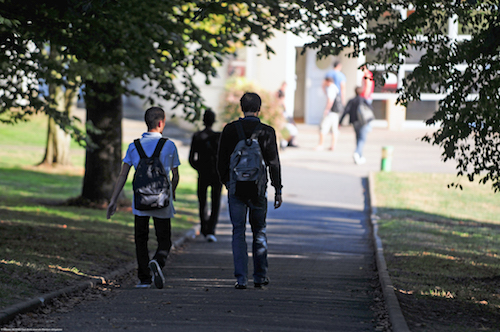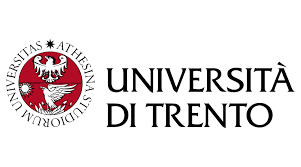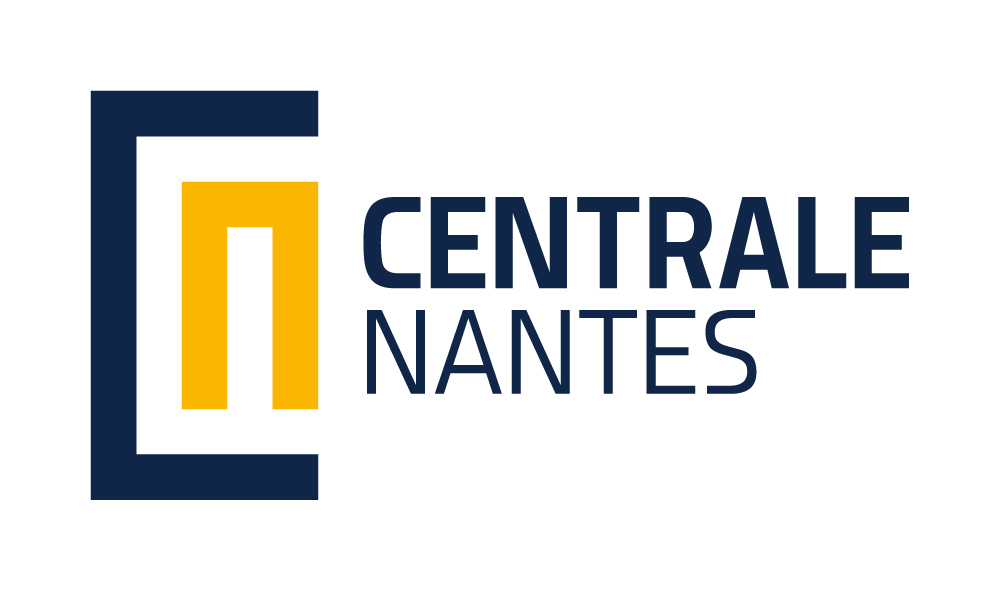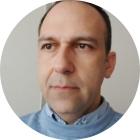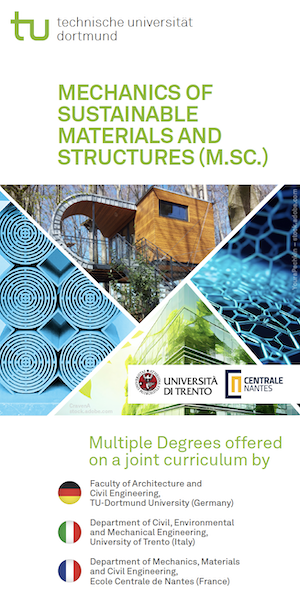Triple Master's Degree - Mechanics of Sustainable Materials and Structures (MS²)
However, there is a shortage of civil engineers with the expertise to design and implement sustainable building practices. To address this shortage, the new Master‘s programme in 'Mechanics of Sustainable Materials and Structures' (MS²) offers students the opportunity to acquire expertise and an open-minded sensitivity towards sustainable solutions.
The programme represents a unique opportunity for aspiring civil engineers to become leaders in the field of sustainable construction, making a significant contribution to the clean energy transition and building a more sustainable future for all.
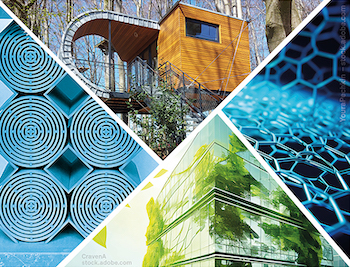
At a glance
- Master of Science - 3 degrees from the participating institutions
- Study in three countries
- Language of instruction: English
- 120 ECTS credits
- Four specialisations on offer
- Next intake: September 2024
- Programme overview
-
Objectives
This programme is designed to train the next generation of civil engineers with the expertise to design and implement innovative building technologies with a focus on sustainable materials and structures. The main objective is to educate future leaders in the development of innovative solutions for sustainability and performance in the built environment by fostering creative and independent thinking and promoting low-impact oriented problem-solving.
This is done by providing a solid background in fundamental mechanics, coupled with cutting-edge research in innovative materials and structures, and a research and development environment in the private sector. This blend of solid fundamental skills, innovative research and link to the private sector is the perfect environment to train engineers who are able to provide innovative solutions to the global today’s challenges.
The programme, which is taught in English over two years, requires a high degree of mobility since all students will study in three different countries: Germany, Italy and France.
Consortium Partners
The three partner institutions are:
- TU-Dortmund University - Faculty of Architecture and Civil Engineering | Germany
- University of Trento - Department of Civil, Environmental and Mechanical Engineering | Italy
- Centrale Nantes - Department of Mechanics, Materials and Civil Engineering | France
Mobility Scheme
All first year students will spend their first semester at TU-Dortmund in Germany, then move to Italy for the second semester at the University of Trento. The second year commences with the autumn semester at Centrale Nantes. For the final semester students can choose in which of the three countries they wish to undertake their Master's thesis.Degrees Awarded
The following qualifications will be awarded to students that successfully complete all programme requirements:- Laurea Magistrale in Ingegneria Civile (class LM 23) from the University of Trento
- Master of Science (M.Sc.) from TU Dortmund
- Master sciences, technologies, santé, mention genie civil / Civil engineering from Centrale Nantes
- Course content
-
30 ECTS Credits per semester.
Language of instruction: English
- M1 Year - Autumn Semester - TU Dortmund
-
ECTS Engineering Mathematics 5 Advanced Continuum Mechanics 8 Enriched Continua and Metamaterials 5 Nonlinear Structural Analysis 6 Construction with trees in practice # 3 How sustainable can building materials be? # 3 Structural systems in Engineering Practices # 3 Organic Design and Structures # 3
# Elective course - choose two of four - M1 Year - Spring Semester - University of Trento
-
ECTS Modelling and simulation of structures 6 Stability of Structures 6 Mechanics of Solids and Structures under Extreme Conditions 6 Machine Learning for Wireless Structural Health Monitoring 6 Metastructures # 6 Risk Analysis and Structural Reliability # 6
# Elective course - choose one of two - M2 Year - Autumn Semester - Centrale Nantes
-
ECTS Mechanics of Porous Media 5 Homogenization Methods for Materials and Structures 5 Coupled problems in mechanics 6 Design and Behaviour of Modern Concrete 5 Durability and Structural Maintenance # 5 Earthquake Engineering # 5 Summer school 2 Modern Languages * 2
# Elective course - choose one of two
* 'French as Foreign Language' except for French native speakers who will study 'Cultural and Communicational English' or Spanish (depending on sufficient demand).
NB Course content may be subject to minor changes
- M2 Year - Spring Semester - Master Thesis
-
Master Thesis supervised by one of the three partner institutions
Possible collaboration with associate partners
30 ECTS credits
- Eligibility and Admissions
-
Admission requirements
- Bachelor’s degree in the field of civil engineering according to the European Qualifications Framework, or another comparable degree in a comparable course of study of at least three years;
- Proven knowledge of the English language of at least level B2 of the Common European Framework of Reference.
How to apply
Applications for September 2024 entry open and close as follows:
- holders of an international bachelor’s degree: from 2 January to 15 July 2024
- holders of a German/European bachelor’s degree, from 15 March to 15 August 2024
- Tuition fees
- The tuition fees for the programme are approximately €1500 per semester. This sum encompasses the tuition fee, or "Semesterbeitrag" at TU Dortmund University, along with the associated fees required for enrollment at the University of Trento and Centrale Nantes.
- Programme Coordinator at Centrale Nantes
-
Giulio Sciarra, Programme Coordinator at Centrale Nantes
Giulio Sciarra is Professor in Mechanics at Centrale Nantes. He heads up the GEOMEC (Environmental Geomechanics) research team in the GeM (Research Institute in Civil and Mechanical Engineering) at Centrale Nantes. He is interested in the mechanics of porous media and geomechanics, both in the framework of numerical modeling and advanced experimental activity, with a particular emphasis in hydro-mechanical instabilities.
Programme Contact
Dr. Jendrik Voss (Study Co-ordinator)
jendrik.voss3889a177-a272-467a-883c-7598bf4a3c90@tu-dortmund.de
Programme Coordinators
- Prof. Giulio Sciarra (giulio.sciarra03505870-e66c-43b7-a645-4a246d8956ea@ec-nantes.fr) | Centrale Nantes
- Prof. Angela Madeo (angela.madeod198fac6-8acd-4c21-a8ba-cd1fec20baec@tu-dortmund.de) | TU Dortmund, Germany
- Prof. Francesco Dal Corso | University of Trento, Italy
Learn more:
Apply online
Applications open from 2 January 2024:
https://international.tu-dortmund.de/en/international-applicants/application/master/
Contact
international1676cd12-c51d-4d83-9c21-ebeddc6a6d4b@ec-nantes.fr
Download the flyer
Meet us
We regularly attend education fairs around the world to meet with prospective students and provide information about our study programmes.
► Stay tuned for upcoming events
Study
- UNDERGRADUATE
- GRADUATE
- Engineering Programme "diplôme d'ingénieur"
- Fast-track Engineering Programme
- 5 Master of Science (MSc) Programmes with 10 Specialisms
- Integrated Master-PhD Track
- 5 Erasmus Mundus Joint Masters
- 3 Joint Master's Programmes
- Advanced Master's "Mastère Spécialisé ® "
- Degree apprenticeship in partnership with ITII
- PhD
- EXCHANGE STUDENTS
- EXECUTIVE EDUCATION
- TUITION FEES AND FINANCING
- MEET OUR GRADUATES
- APPLY NOW
- INNOVATIVE TEACHING
- A VOCATIONAL APPROACH
- ENTREPRENEURSHIP
- CIVIC ENGAGEMENT
- DEGREE CERTIFICATES
- KEY DATES FOR THE ACADEMIC YEAR









